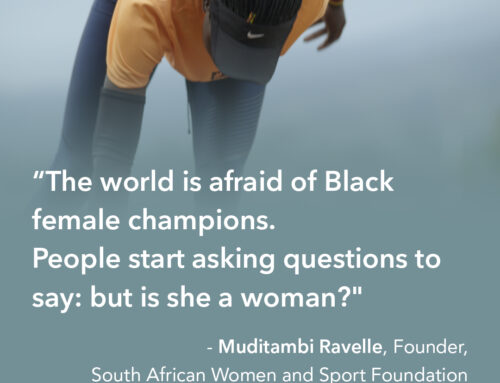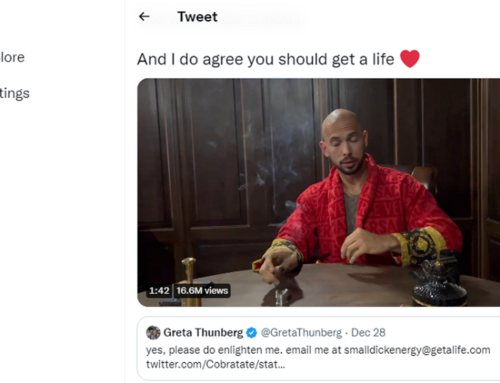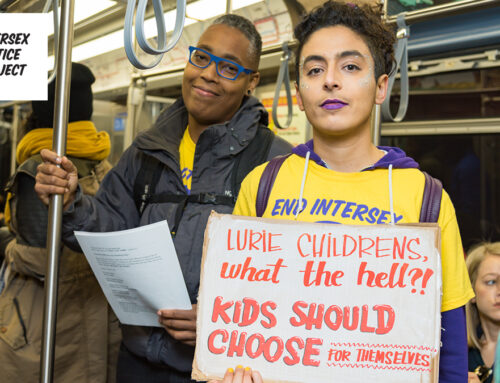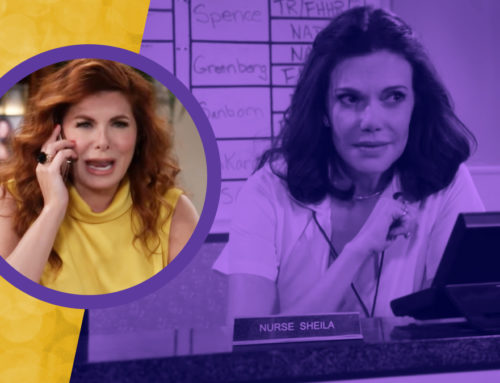Netflix teen comedy Sierra Burgess is a Loser is under fire for insensitive portrayals of several marginalized groups.
In addition to modeling anti-trans and anti-gay insults, positively framing a non-consensual kissing scene, and mocking the Deaf community, SBIAL perpetuates ignorance that harms the intersex community. The film is the latest in a long line of comedies using “hermaphrodite,” a slur against intersex people, as a punchline.
Heroine Sierra Burgess (Shannon Purser) develops a telephone relationship with her crush, who she tricks into thinking she is one of the popular girls at their high school. Pushed into approaching her crush by friend Dan (RJ Cyler), Burgess pretends to be deaf to avoid revealing her voice and identity. Cyler’s character teases:
“She can’t hear anything that I say, so even if I say something like ‘she’s a hermaphrodite’—which she isn’t—she’s not, she’s not a hermaphrodite at all… She’s all lady parts.”
This dialogue occurs 52 minutes into the movie, or at about 53 minutes elapsed per Netflix’s timing.
The word “hermaphrodite” has been used as a slur against the intersex community for decades. Intersex refers to people who are born with any of a range of sex characteristics, such as genitals, hormones, or chromosomes, that may not fit a doctor’s notions of binary “male” or “female” bodies. There are over 30 specific intersex variations, and each intersex person is different.
The medical community has long relied on stigma and misinformation to justify a form of human rights abuse on people born with diverse sex characteristics: non-consensual sterilizing and sexually damaging surgeries, such as clitoral reductions and orchiectomies. These procedures are condemned by the state of California, the United Nations, Amnesty International, and Human Rights Watch, but still continue daily.
Intersex people experience real discrimination and medical violence. Using “hermaphrodite” as an insult glosses over the injustices we face.
When confronted about the film’s transphobic and anti-lesbian dialogue by Twitter user @harryshumsbitch, screenwriter Lindsay Beer’s first response was to justify the comments’ use in creating a mean-girl character, per “personal experience:”

A twitter exchange with screenwriter Lindsey Beer, per this thread.
Modeling hurtful language, even to vilify a character, is still modeling hurtful language. It teaches viewers that calling someone transgender or intersex can still be an insult in 2018. Identities are not insults.
Media has the power to change this discussion for the better, and young intersex advocates are modelling the right way to talk about intersex realities. In 2014, MTV’s teen comedy series Faking It worked with intersex consultants from interACT to create TV’s first intersex main character: a high school student named Lauren. The writing and the character were fully informed by intersex people and helped dispel harmful stereotypes bundled with the media’s common use of the “H-word.” It was the first time many intersex kids saw themselves on-screen.

interACT Youth Program Manager Amanda Saenz appeared on Faking It as the first intersex person to play an intersex character on television.
“I was upset. [I thought] that nothing like that could happen in today’s media,” lamented Kenna, 16, a teen intersex advocate who watched the film. “It just sucks, you know?”
Generation Z is the most open-minded yet. Today’s young people are pioneering LGBTQ+ and intersex inclusivity, and they deserve better from their media.
Beer boasts her cast’s diversity via a Tweet featured in a Decider interview: “Actors of every size, shape, [and] race. A deaf character played by a DEAF person. Representation matters.”
Herein lies the problem with checkbox “diversity:” simply checking boxes without centering those groups’ voices perpetuates harm and stereotyping. Had screenwriters sought out the guidance of deaf writers, trans writers, intersex writers—the list goes on—it could have easily flagged harmful issues early on while allowing communities to participate in telling their own stories. That ownership could show viewers our humanity instead of commodifying our differences for laughs.
Beer is absolutely right: representation matters. What if instead of perpetuating the same cruel jokes they experienced as teens, screenwriters could use opportunities like Sierra Burgess to model aspirational behaviors, side by side with marginalized communities? Representation is power, and Sierra Burgess represents a serious missed opportunity for writers to create sensitive, modern teen representation.
interACT is a national advocacy organization centering intersex youth in media representation. We offer a free media guide and language sensitivity guide with tips on how to accurately portray intersex people, including avoiding the “H” slur. Of course, there is no substitute for consulting and compensating writers from marginalized communities. If anyone from the SBIAL production team would like to talk, interACT’s doors are always open.







